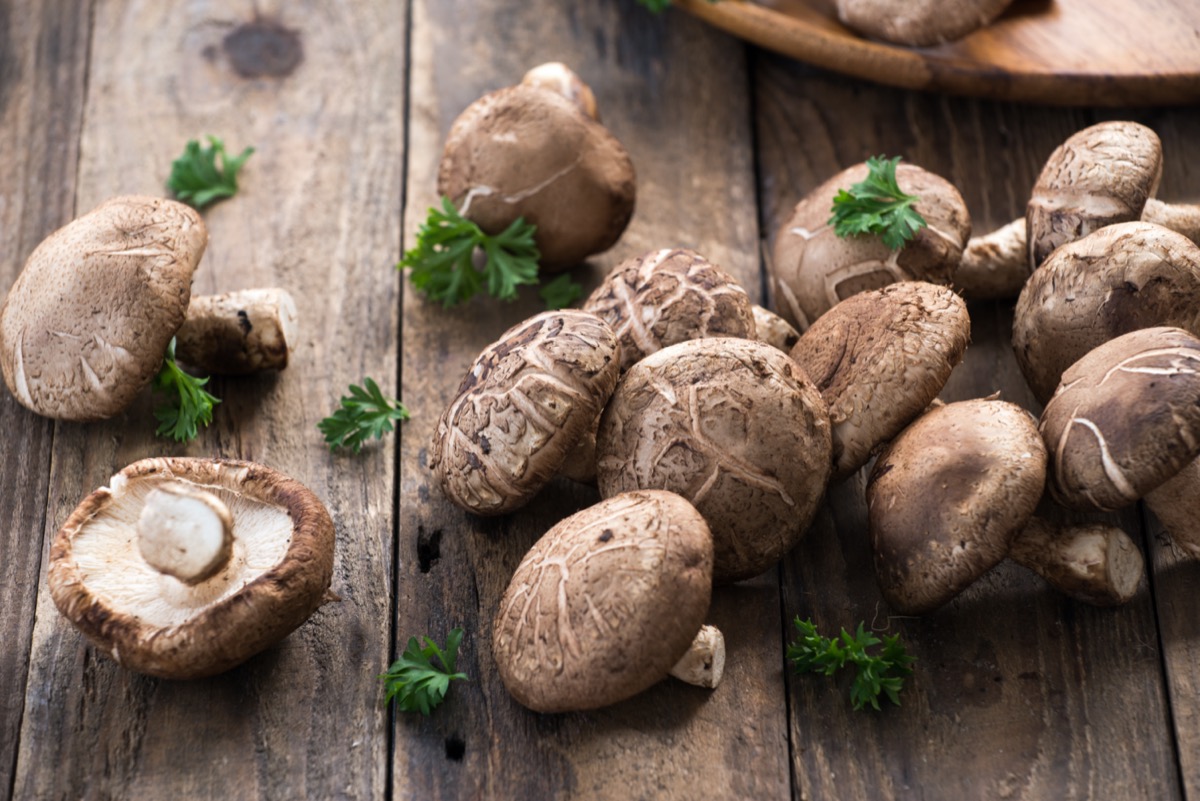Swapping Red Meat for This Food Can Lengthen Your Life, New Study Says

There's a fungus among us that may help reduce our risk of deadly chronic diseases like diabetes and cancer if we eat it regularly, especially if we substitute it for less healthful fare—mushrooms.
Mushrooms, and we're talking about all varieties of 'shrooms, are low in calories and fat, and contain important health-promoting vitamins, minerals, and modest amounts of fiber. They are rich in the sulfur-containing antioxidants ergothioneine and glutathione, which are believed to play roles in healthy aging, according to a 2017 report in Food Chemistry.
Mushrooms are also a prebiotic; their polysaccharides promote beneficial bacteria in the gut. Some epidemiological studies suggest associations between mushroom eating and lower risks of breast cancer, metabolic syndrome, and dementia in the elderly, while other studies found no such significant observations.
But now, new research published in 2021 in Nutrition Journal tosses mushrooms back into the longevity pan: Penn State scientists have shown in a nationally representative study an association between eating more mushrooms and lower risk of all-cause mortality.

Mushrooms Instead of Meat
The researchers from Penn State's College of Medicine, College of Agriculture, and Department of Nutritional Sciences analyzed dietary data from 15,546 male and female adults participating in the Third National Health and Nutrition Examination Survey (NHANES III, 1988-1994). They calculated mushroom consumption by looking at their intake of foods that were mostly mushrooms or mushrooms alone—for example, an egg omelet or scrambled egg served with mushrooms, or dishes with mushrooms as a recipe component.
The researchers then linked the study participants to public mortality files and, using a probability algorithm, found a strong correlation between individuals who consumed mushrooms and a lower risk of all-cause death compared with individuals who did not eat mushrooms. The study also found that replacing one serving of red or processed meat daily with one serving of mushrooms—say, a portabella cap burger instead of a hamburger—was associated with a lower risk of all-cause mortality as well.
The researchers believe that the antioxidant ergothioneine, nicknamed the "longevity vitamin," which is found in high amounts in mushrooms but not in other foods, may play a role in reducing chronic diseases. They also describe the antioxidant as having anti-inflammatory and anti-aging properties. To that end, here are 20 Healthy Mushroom Recipes for a Meatless Dinner.

Mushrooms Against Cancer
A related Penn State study published in March 2021 edition of Advances in Nutrition, suggests that mushrooms' antioxidant powers may be beneficial in preventing cancer. The meta-analysis reviewed 17 cancer studies and data from more than 19,500 cancer patients and found that people who incorporated any type of mushroom into their daily diets had a lower risk of cancer.
Researchers determined that individuals who ate about 1/8th to ¼ cup of mushrooms daily had a 45% lower risk of cancer compared to those who did not eat mushrooms. When looking at specific types of cancers, the researchers noted the strongest inverse association with breast cancer. People who regularly ate mushrooms had a significantly lower risk of breast cancer.
"Mushrooms are the highest dietary source of ergothioneine, which is a unique and potent antioxidant and cellular protector," said Djibril M. Ba, a graduate student in epidemiology at Penn State College of Medicine in a press release. "Replenishing antioxidants in the body may help protect against oxidative stress and lower the risk of cancer."
For more incentive to pick up mushrooms at the grocery store today, check out What Happens to Your Body When You Cut Out Red Meat from Your Diet.








